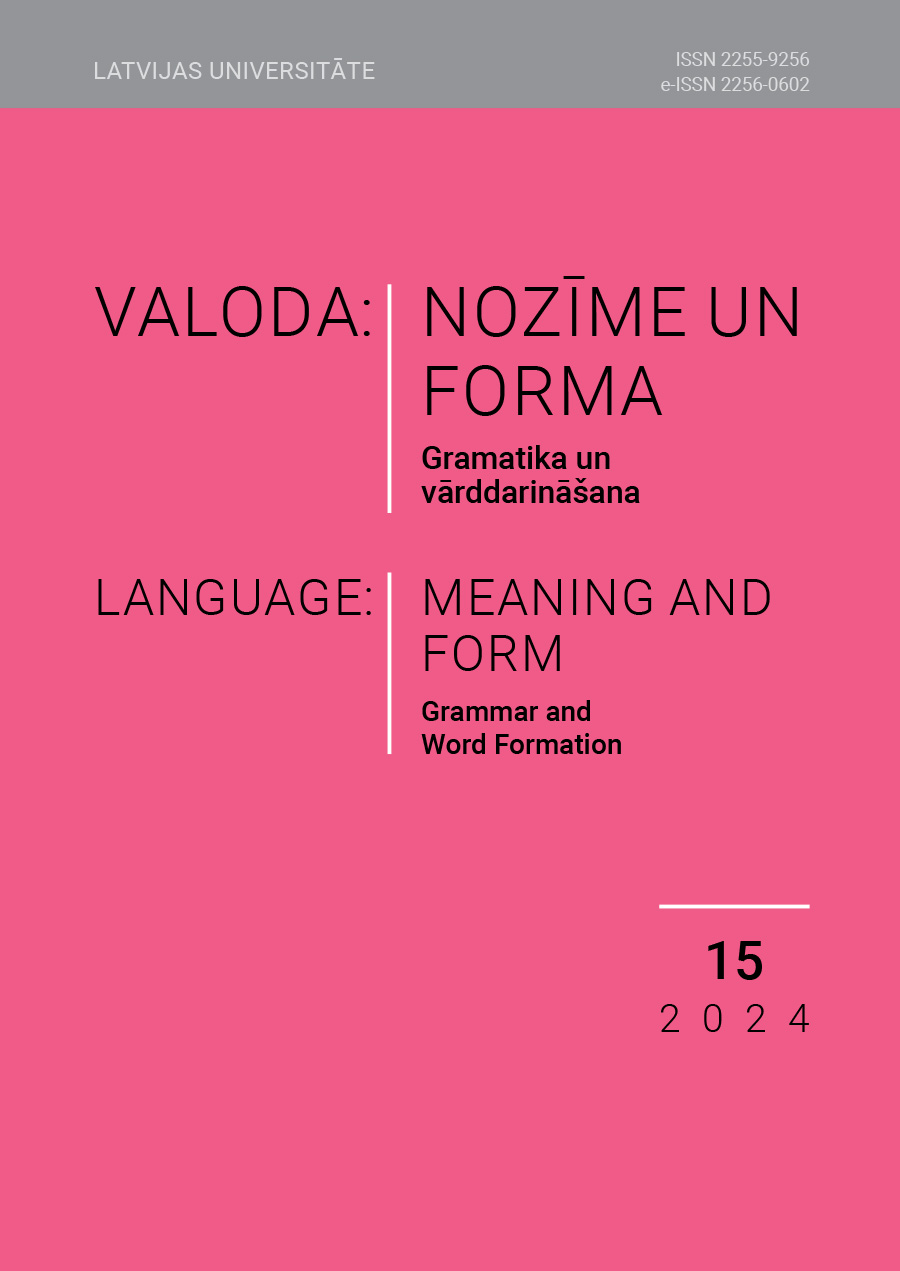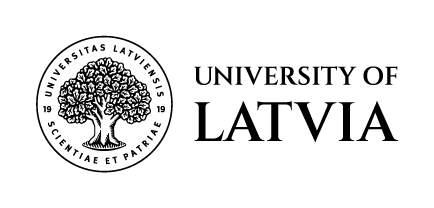Prefixes in noun word-formation models and semantics of derivatives
DOI:
https://doi.org/10.22364/vnf.15.03Keywords:
noun, word-formation, prefix, prefixationAbstract
For deriving nouns in Latvian, the prefixation is used much less frequently than the suffixation. Most nouns containing a prefix are derived from prefixed verbs. However, there are also prefixed nouns derived from other nouns. This study examines productive noun word-formation models that employ prefixation. The study analyses 238 nouns from “The Balanced Corpus of Modern Latvian LVK2018”, their word-formation models, and noun semantics. Any prefix may impart the noun a spatial meaning associated with the direction of the adverb corresponding to the prefix. Some prefixes can give a noun temporal or quantitative meaning. However, compared to prefixed verbs, the range of noun meanings is limited. The derivation models with prefixes pa- ‘under’ and aiz- ‘behind’ are more productive. Among the derivatives considered, approximately 24 % of nouns in the corpus have only one example of usage. The corpus also contains some common lexicalized prefixed nouns, such as pasaule ‘the world’.
References
Levāne-Petrova, Kristīne, Darģis, Roberts. 2018. Līdzsvarotais mūsdienu latviešu valodas tekstu korpuss (LVK2018). CLARIN-LV digitālā bibliotēka. Pieejams: http://hdl.handle.net/20.500.12574/11
Levāne-Petrova, Kristīne et al. 2022. Līdzsvarotais mūsdienu latviešu valodas tekstu korpuss (LVK2022). CLARIN-LV digitālā bibliotēka. Pieejams: http://hdl.handle.net/20.500.12574/84
Mīlenbahs, Kārlis. 1923. K. Mulenbacha Latviešu valodas vārdnīca. Lettisch-deutsches Woerterbuch. I. Rediģējis, papildinājis, turpinājis Jānis Endzelīns. Rīga: Izglītības ministrija.
Mīlenbahs, Kārlis. 1927. K. Mulenbacha Latviešu valodas vārdnīca. Lettisch-deutsches Woerterbuch. III. Rediģējis, papildinājis, turpinājis Jānis Endzelīns. Rīga: Kultūras fonda izdevums.
Spektors, Andrejs et al. 2024. Tēzaurs.lv, 2024, Vasaras versija. CLARIN-LV digitālā bibliotēka. Pieejams: http://hdl.handle.net/20.500.12574/107
Deksne, Daiga. 2021. Priedēkļverbu semantika un funkcionalitāte latviešu valodā. Promocijas darbs. Rīga: Latvijas Universitāte. https://doi.org/10.22364/vnf.11.02
Kalme, Vilma, Smiltniece, Gunta. 2001. Latviešu literārās valodas vārddarināšana un morfoloģija. Lokāmās vārdšķiras. Liepāja: LiepU.
Kalnača, Andra. 2014. A Typological Perspective on Latvian Grammar. Warsaw/Berlin: De Gruyter Open.
Kalnača, Andra, Lokmane, Ilze. 2016. Compound genitives in Latvian. Word-Formation across Languages. Körtvélyessy, Lívia, Štekauer, Pavol, Valera, Salvador (eds.). Newcastle upon Tyne: Cambridge Scholars Publishing, 169–197.
Kalnača, Andra, Lokmane, Ilze. 2021. Latvian Grammar. Rīga: University of Latvia Press. https://doi.org/10.22364/latgram.2021
Marchand, Hans. 1964. A set of criteria for the establishing of derivational relationship between words unmarked by derivational morphemes. Indogermanische Forschungen. 69, 10–19. https://doi.org/10.1515/9783110243116.10
Rapa, Sanda. 2014. Ģeogrāfiskās nomenklatūras vārdi latviešu toponīmijā. Promocijas darbs. Rīga: Latvijas Universitāte. Pieejams: https://dspace.lu.lv/dspace/handle/7/4573
Ševčíková, Magda. 2021. Action nouns vs. nouns as bases for denominal verbs in Czech: A case study on directionality in derivation. Word Structure. 14(1), 97–128. https://doi.org/10.3366/word.2021.0181
Vulāne, Anna. 2015. Vārddarināšana. Latviešu valodas gramatika. 2. izd. Nītiņa, Daina, Grigorjevs, Juris (red.). Rīga: Latvijas Universitātes Latviešu valodas institūts, 190–299.
Downloads
Published
Issue
Section
License

This work is licensed under a Creative Commons Attribution-NoDerivatives 4.0 International License.


